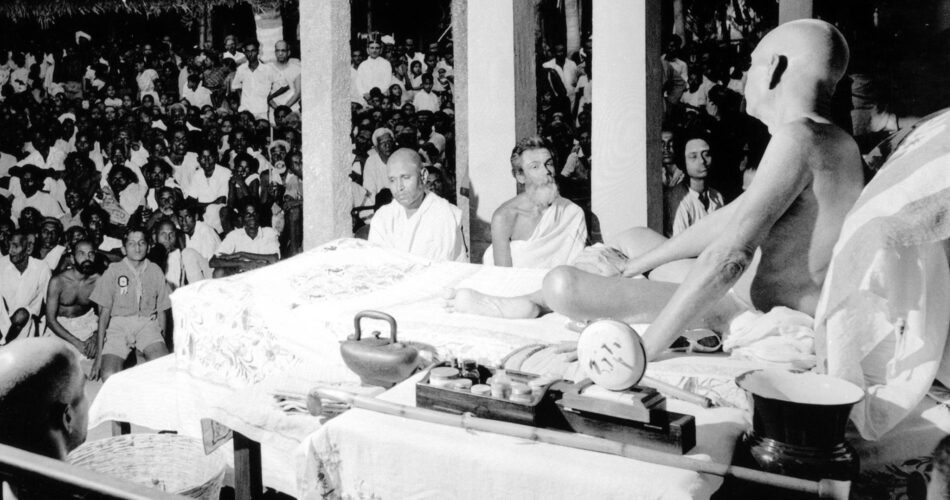Ramana Maharshi was born on December 30, 1879. His birth anniversary is celebrated every year by his followers and devotees as “Ramana Jayanti”. On this day, special prayers, chanting, and spiritual discourses are organized at the Ramana Maharshi Ashram and at various other places around the world to honor his life and teachings. It is a time for reflection, introspection, and deepening one’s spiritual practice, and it is observed with great reverence and devotion by those who follow the teachings of Ramana Maharshi.
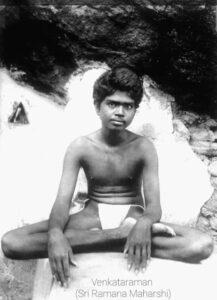
Ramana Maharshi (1879-1950) was an Indian sage and spiritual teacher, considered to be one of the most important figures in the Advaita Vedanta tradition. He was born in the town of Tiruchuzhi in Tamil Nadu, India, and at the age of 16, he had a transformative spiritual experience which led him to renounce the world and become a sannyasin (renunciate).
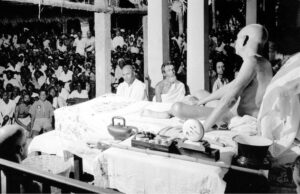
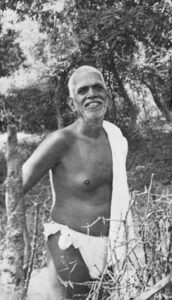
Ramana Maharshi is best known for his teachings on self-inquiry, the practice of asking oneself the question “Who am I?” in order to directly experience the true nature of the self. He taught that the true self, or Atman, is not separate from the ultimate reality or Brahman, and that the goal of spiritual practice is to realize this non-dual nature of the self.
Ramana Maharshi spent most of his life at the ashram he founded at the foot of the Arunachala mountain in Tiruvannamalai, where he received visitors from all over the world who came to seek his guidance and teachings. He also wrote several works, including the spiritual classic “Talks with Sri Ramana Maharshi” and “Upadesa Saram”, a concise text on the essentials of self-inquiry.
Ramana Maharshi is widely regarded as one of the most influential spiritual teachers of the 20th century, and his teachings continue to inspire and guide spiritual seekers around the world.
The Ramana Maharshi Ashram, also known as the Sri Ramanasramam, is located at the foot of the Arunachala mountain in the town of Tiruvannamalai, Tamil Nadu, India. It was founded by Ramana Maharshi in 1922, and it continues to be a center for spiritual practice and pilgrimage.
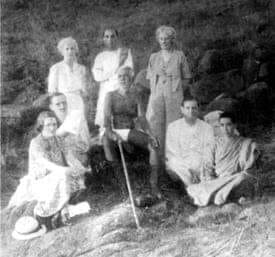
The ashram houses a shrine with the samadhi (burial place) of Ramana Maharshi, as well as several other shrines and meditation halls. Visitors can participate in daily routines, including morning and evening chanting, meditation, and self-inquiry sessions. The ashram also offers various spiritual retreats and programs throughout the year.
The Ramana Maharshi Ashram has become a major destination for spiritual seekers from all over the world, who come to experience the peaceful atmosphere and to learn about Ramana Maharshi’s teachings on self-inquiry and non-dual realization. It continues to be an important center for Advaita Vedanta and spiritual practice.
One mantra that was often repeated in his presence was the mantra “Arunachala Siva,” which refers to the holy mountain Arunachala in Tamil Nadu, India, that was considered sacred by Ramana Maharshi. Some of his followers also chanted “Om Namah Shivaya” or other mantras as a means of devotion or meditation.

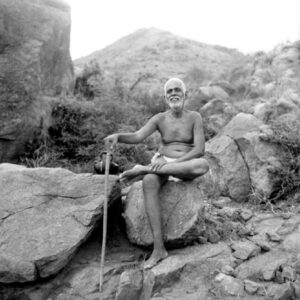
Ramana Maharshi was known for his teachings on self-inquiry and self-realization, and his spiritual influence on many people. While he did not claim to perform miracles, there are some accounts of what are considered to be miraculous events associated with him. Here are a few examples:
- Curing illnesses – Many people who visited Ramana Maharshi reported being cured of illnesses, including chronic conditions, after being in his presence or receiving his blessings.
- Psychic powers – There are stories of Ramana Maharshi displaying psychic powers, such as being able to see through walls or read people’s thoughts.
- Divine visions – Some people who were close to Ramana Maharshi reported seeing divine visions or experiencing spiritual awakenings in his presence.
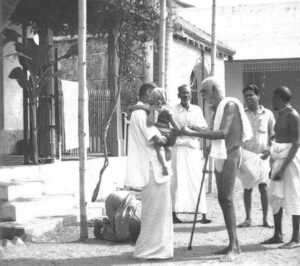
Ramana Maharshi wrote very little, but his teachings were recorded and compiled by his devotees into several books. Some of the most popular books on Ramana Maharshi’s teachings are:
- “Talks with Sri Ramana Maharshi” – a collection of conversations between Ramana Maharshi and his devotees, covering a wide range of spiritual topics.
- “Who Am I?” – a brief but profound text outlining the practice of self-inquiry as taught by Ramana Maharshi.
- “Upadesa Saram” – a concise and powerful text on the essentials of self-inquiry and non-dual realization.
- “Forty Verses on Reality” – a poetic exposition of the non-dual nature of reality, attributed to Ramana Maharshi.
- “Guru Vachaka Kovai” – a collection of sayings and teachings of Ramana Maharshi, compiled by one of his close devotees, Muruganar.
These books, along with several others, have become classics of spiritual literature and continue to inspire and guide spiritual seekers around the world.
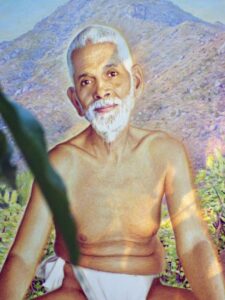
Here are some website links where you can find resources related to Ramana Maharshi and his teachings:
- Sri Ramanasramam Bookstore – https://bookstore.sriramanamaharshi.org/
- HolyBooks.com – https://www.holybooks.com/category/advaita-vedanta/
- Advaita Vedanta Library – https://www.advaita-vedanta.org/library/library.html
- Archive.org – https://archive.org/details/ramanamaharshi
- Amazon Kindle Store – https://www.amazon.com/s?k=ramana+maharshi&ref=nb_sb_noss_1
Here are the links to some of the websites where you can find free PDF downloads of books on Ramana Maharshi’s teachings:
- Sri Ramanasramam Bookstore: https://www.sriramanamaharshi.org/resource_centre/books/
- Archive.org: https://archive.org/search.php?query=ramana+maharshi&sin=TXT
- Advaita Vedanta Library: https://www.advaita-vedanta.org/library/library.html
There are several books on Ramana Maharshi’s teachings available in Telugu. Some of the popular ones are:
- “Ramana Maharshi Jeevitam” by Chalam – This is a biography of Ramana Maharshi in Telugu.
- “Ramana Gita” by Kshetrayya Sarma – This is a Telugu translation of “Talks with Sri Ramana Maharshi.”
- “Naan Yaar” (Telugu translation: “Nenu Emi”) – This is a Telugu translation of “Who Am I?”
- “Sri Ramana Sahasranamam” by Vasu Nagalingam – This is a Telugu translation of “Sri Ramana Sahasranama,” a hymn of 1000 names of Ramana Maharshi.
These books and more can be found in bookstores or online retailers that offer Telugu language books. Some online bookstores that sell Telugu books include:
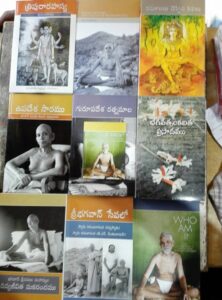
- Kinige (https://kinige.com/) – This is an online bookstore that offers Telugu language books on various subjects, including spirituality.
- Pustakam.net (https://pustakam.net/) – This is another online bookstore that offers a wide selection of Telugu language books.
- Amazon.in (https://www.amazon.in/) – Amazon India has a selection of Telugu language books on spirituality, including books on Ramana Maharshi’s teachings.
Ramana Maharshi’s last words were “Arunachala Siva,” which refers to the holy mountain Arunachala in Tamil Nadu, India, that was considered sacred by him. According to the eyewitness accounts, on the morning of April 14, 1950, Ramana Maharshi’s health began to deteriorate rapidly, and he appeared to be nearing the end of his life. Many of his devotees gathered around him, and as he took his last breaths, he remained in a state of deep meditation.

Moments before his death, a devotee asked him what they should do after he was gone. Ramana Maharshi responded with his last words, “Arunachala Siva,” indicating that they should continue to meditate and seek spiritual enlightenment through the practice of self-inquiry and devotion to the divine.
Ramana Maharshi’s teachings continue to inspire people all over the world, and his legacy as one of the great sages of modern times lives on through the numerous books, recordings, and other resources that preserve his teachings for future generations.
